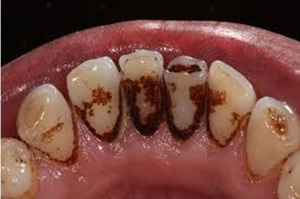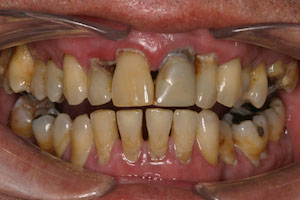Tobacco Damage Teeth

 Smoking is a major cause of cancers of the mouth and throat. Provided cancer is not already present, stopping smoking halves the risk of mouth and throat cancer within five years, and the risk continues to decline over time. People who smoke and are heavy drinkers have very high risks for mouth and throat cancer.
Smoking is a cause of periodontitis, a common dental disease. Its symptoms may include infected gums, loss of the jawbone that supports the teeth and deep spaces forming around the teeth (periodontal pockets). Stopping smoking reduces the risk of developing periodontal disease and slows down the progress of existing disease.
Smoking affects the immune system, making smokers more likely to develop bacterial infection. Also, smoking impairs healing of gum and bone. Stopping smoking improves wound healing within one to eight weeks.
How can tobacco cause periodontal (gum) disease?
Smoking may be responsible for almost 75 percent of periodontal diseases among adults. Tobacco products damage your gum tissue by affecting the attachment of bone and soft tissue to your teeth. An example of the effect is receding gums. A receding gum line exposes the tooth roots and increases your risk of developing a sensitivity to hot and cold, or tooth decay in these unprotected areas.
What effects can smokeless tobacco have on my oral health?
Like cigarettes, smokeless tobacco products contain a variety of toxins associated with cancer. At least 28 cancer-causing chemicals have been identified in smokeless tobacco products.
Smokeless tobacco is known to cause cancers of the mouth, lip, tongue and pancreas. Users also may be at risk for cancer of the voice box, esophagus, colon and bladder, because they swallow some of the toxins in the juice created by using smokeless tobacco.
Smokeless tobacco can irritate your gum tissue, causing periodontal (gum) disease. Sugar is often added to enhance the flavour of smokeless tobacco, increasing the risk for tooth decay. Smokeless tobacco also typically contains sand and grit, which can wear down your teeth.
Are cigars a safe alternative to cigarettes?
Cigars are not a safe alternative to cigarettes. Even if you do not inhale cigar smoke, you are still at risk for oral and pharyngeal (throat) cancers. Like cigarette smokers, cigar smokers are at increased risk for periodontal (gum) disease, a leading cause of tooth loss. In addition to the health risks, cigar smoke, like cigarette smoke, can cause staining of the teeth and tongue as well as bad breath.
Smoking is a major cause of cancers of the mouth and throat. Provided cancer is not already present, stopping smoking halves the risk of mouth and throat cancer within five years, and the risk continues to decline over time. People who smoke and are heavy drinkers have very high risks for mouth and throat cancer.
Smoking is a cause of periodontitis, a common dental disease. Its symptoms may include infected gums, loss of the jawbone that supports the teeth and deep spaces forming around the teeth (periodontal pockets). Stopping smoking reduces the risk of developing periodontal disease and slows down the progress of existing disease.
Smoking affects the immune system, making smokers more likely to develop bacterial infection. Also, smoking impairs healing of gum and bone. Stopping smoking improves wound healing within one to eight weeks.
How can tobacco cause periodontal (gum) disease?
Smoking may be responsible for almost 75 percent of periodontal diseases among adults. Tobacco products damage your gum tissue by affecting the attachment of bone and soft tissue to your teeth. An example of the effect is receding gums. A receding gum line exposes the tooth roots and increases your risk of developing a sensitivity to hot and cold, or tooth decay in these unprotected areas.
What effects can smokeless tobacco have on my oral health?
Like cigarettes, smokeless tobacco products contain a variety of toxins associated with cancer. At least 28 cancer-causing chemicals have been identified in smokeless tobacco products.
Smokeless tobacco is known to cause cancers of the mouth, lip, tongue and pancreas. Users also may be at risk for cancer of the voice box, esophagus, colon and bladder, because they swallow some of the toxins in the juice created by using smokeless tobacco.
Smokeless tobacco can irritate your gum tissue, causing periodontal (gum) disease. Sugar is often added to enhance the flavour of smokeless tobacco, increasing the risk for tooth decay. Smokeless tobacco also typically contains sand and grit, which can wear down your teeth.
Are cigars a safe alternative to cigarettes?
Cigars are not a safe alternative to cigarettes. Even if you do not inhale cigar smoke, you are still at risk for oral and pharyngeal (throat) cancers. Like cigarette smokers, cigar smokers are at increased risk for periodontal (gum) disease, a leading cause of tooth loss. In addition to the health risks, cigar smoke, like cigarette smoke, can cause staining of the teeth and tongue as well as bad breath.










